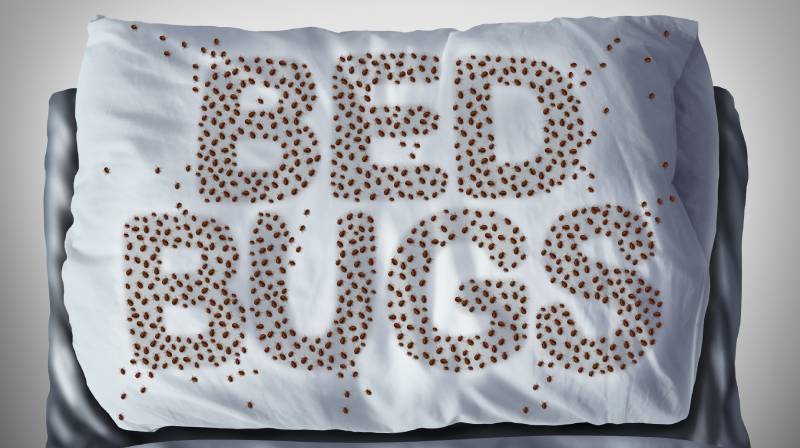
Bed bugs cause a lot of frustration and stress for people who own homes or travel frequently. Knowing more about bed bugs can assist in preventing these pests from infesting your home. It also helps to know what steps to take if you have problems with them in a hotel you were staying in. This blog provides important information on identifying bed bugs, understanding the reactions they cause, treating infestations effectively, and knowing your legal rights should you encounter these pests while traveling in Florida.
What Are Bedbugs?
The phrase “bed bugs,” or in scientific words, Cimex lectularius, refers to tiny insects with a reddish-brown color that consumes human and animal blood for sustenance. They behave as pests during nighttime while frequently secluding themselves within gaps and small openings during the day. Their small, slim shape helps them to hide in locations like mattresses, bed frames, headboards, and behind wallpapers.
Bed bugs are often found in high-traffic areas such as hotels, apartment buildings, and student dorms. However, they can also invade houses. While these tiny creatures do not spread diseases, their bites may lead to severe itching, unease, and allergic reactions.
The main sign of a bed bug problem is tiny, red-brown spots on your sheets, mattresses, or walls. These marks could be either bed bug feces or blood smears. You might detect a stale and sweet odor if the issue is severe.
What Does a Bed Bug Reaction Look Like?
Bed bug reactions are different for every person, with some people feeling severe itching and others not having any signs. Here are the usual indications of bed bug bites:
- Red Bumps or Welts: The usual signs of bed bug bites are tiny, red, and itchy bumps. They might appear in a line or gathered together because bed bugs have the habit of biting several times at one spot.
- Delayed Reaction: Unlike mosquito bites, the reaction to a bed bug bite might not be immediate. It could take several hours or perhaps days for the marks of a bite to show up noticeably, making it hard to identify where they came from.
- Strong Scratching Sensation: Bed bug bites can cause very strong itching, and too much scratching might result in other infections.
- Allergy Problems: Sometimes, individuals can have an allergic reaction to bed bug bites that could cause bigger swellings, blisters, or severe itching.
How to Get Rid of Bed Bugs
Understanding how to eradicate bed bugs is essential in stopping them from spreading and restoring peace in your space. Bed bugs are robust nuisances; removing them typically requires multiple steps. Here’s what to do:
- Confirm the Infestation: If you suspect bed bugs, confirm their infestation by finding their usual hiding areas, such as mattress seams, bed structures, skirting boards, and behind images or wallpapers. Recognizing bed bugs early can simplify the treatment process considerably.
- Deep Clean: All impacted clothes, bed sheets, and linens must be washed in very hot water. After that, dry them at high temperatures. Bed bugs cannot live in intense heat, so doing a deep clean can significantly reduce their population. Use a vacuum cleaner on your mattress, floor, and nearby regions to remove any bugs you can easily spot.
- Apply Bed Bug Covers: Invest in mattress and box spring protections specially constructed to catch bed bugs.
- Pesticides and Professional Removal: While you can find some relief with pesticides from local stores, hiring expert pest control services for total extermination of the infestation is often essential. Pest control companies have specialized equipment and chemical substances that can eliminate bed bugs in every phase of their life cycle, which makes professional handling a highly effective solution.
- Heat Treatment: Heat treatments are perfect for destroying bed bugs and their eggs. People who get rid of pests professionally may use cleaning with steam or treatments that warm the whole room. These methods can touch every hiding spot, eliminating all bed bugs.
Can I Sue for Bed Bugs?
Should you find yourself in a situation with bed bugs at a hotel in Florida, you may be asking, “Can I sue for bed bugs?” The answer depends on a number of things, such as: where did the infestation happen? Did the owner of the property or manager know about the problem? And then, were measures taken by them to either prevent it from happening or sort it out once it happened?
In Florida, landlords, hotel owners, and those who manage properties must keep their places clean and livable. To do this effectively, they must implement measures to prevent or control bed bug infestations. If there is a failure in these duties and you experience things like bed bug bites or damage to your property due to insects, if you incur costs for pest control management, then you can make legal claims against them.
Contact Us for Help with Bed Bug Cases in Florida
Managing a bed bug infestation is more than a mere annoyance; it can lead to physical discomfort, financial problems, and emotional stress. If you’ve faced the problem of bed bugs in a hotel or rental property while staying in Florida, you should know about the solutions that are available for you. At Beregovich Law, our commitment lies in assisting clients with what they need regarding bed bugs and guiding them toward seeking payment if their rights as tenants or visitors have been infringed upon. Contact us today to set up a consultation with our bed bugs injury lawyers.






